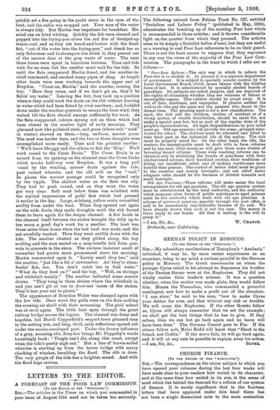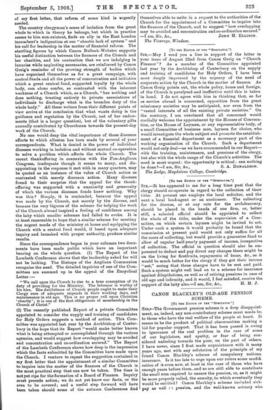CHURCH FINANCE.
[TO THE EDITOR Of TUE " se rtere.ron."] SIR,—The correspondence on the above subject to which you have opened your columns during the last four weeks will have made clear to your readers how varied in its character, and at the same time how united in its aim, is the sense of need which lies behind the demand for a reform of our system of finance. It is surely significant that in the fourteen letters that have appeared under this head there has not been a single dissentient note to the main contention
of my first letter, that reform of some kind is urgently needed.
The country clergyman's sense of isolation from the great whole to which in theory he belongs, but which in practice seems to him non-existent, finds an ally in the East London incumbent's indignation at our " chaotic lack of system" and his call for leadership in the matter of financial reform. The startling figures by which Canon Bullock-Webster supports his useful distinction between the finances of the Church and her charities, and his contention that we are indulging in luxuries while neglecting necessaries, are reinforced by Canon
Greig's reminder of the growing strength of bodies which have organised themselves as for a great campaign, with
central funds and all the power of concentration and initiative which a great central fund, supported loyally by the whole body, can alone confer, as contrasted with the inherent weakness of a Church which, as a Church, "has nothing and does nothing, trusting entirely to private associations of individuals to discharge what is the bounden duty of the whole body." All these writers from their different points of view arrive at the conclusion that what wants doing is the guidance and regulation by the Church, not of her endow- ments (that is a larger question), but of the voluntary gifts annually contributed by Churchmen towards the present-day work of the Church.
No one would deny the vital importance of those diocesan efforts to which allusion has been made by several of your correspondents. What is denied is the power of individual dioceses working in isolation and without mutual co-operation to solve a problem which affects the whole Church. The recent thankoffering in connexion with the Pan-Anglican Congress, inadequate though it seems to many, and dis- appointing in the response it met with in many quarters, may be quoted as an instance of the value of Church action as contrasted with merely diocesan action. Many dioceses found to their surprise that the appeal for the thank- offering was supported with a unanimity and generosity of which the various diocesan funds knew nothing. Why was this ? Simply, it is contended, because the appeal was made by the Church, not merely by the diocese, and because the very bigness of the scheme for helping the work of the Church abroadinspired a feeling of confidence among the laity which smaller schemes had failed to evoke. It is at least reasonable to hope that a similar scheme for meeting the urgent needs of the ministry at home and equipping the Church with a central fund would, if based upon adequate inquiry and launched with proper authority, produce similar results.
Since the correspondence began in your columns two docu- ments have been made public which have an important bearing on the whole question. (1) The Report of the Lambeth Conference shows that the leadership asked for will not be lacking. The Bishops of the Anglican Communion recognise the need. The detailed inquiries of one of the Com- mittees are summed up in the appeal of the Encyclical Letter
We call upon the Church to rise to a true conception of its duty of providing for the Ministry. The labourer is worthy of his hire. The dutifulness of Church people ought to make their Clergy sure of adequate stipends in their working days, and maintenance in old age. This is no proper call upon Christian ' charity' ; it is one of the first obligations of membership in the Church of Christ."
(2) The recently published Report of a private Committee appointed to consider the supply and training of "candidates for Holy Orders suggests a method of action. This Com- mittee was appointed last year by the Archbishop of Canter- bury in the hope that its Report "would make better known what is being attempted or accomplished through the various
agencies, and would suggest how overlapping may be avoided
and concentration and co-ordination secured." The Report of the Lambeth Conference shows how deep is the impression which the facts submitted by the Committee have made upon the Church. I venture to repeat the suggestion contained in my first letter that the appointment of a similar Committee to inquire into the matter of the finances of the Church is the most practical step that can now be taken. The time is not yet ripe for the formation of a Board of Finance. Inquiry must precede action; we do not yet know our facts, or the area to be covered; and a useful step forward will have been taken should some of the autumn Conferences find themselves able to unite in a request to the authorities of the Church for the appointment of a Committee to inquire into the finances of the Church, and to suggest " how overlapping may be avoided and concentration and co-ordination secured."







































 Previous page
Previous page